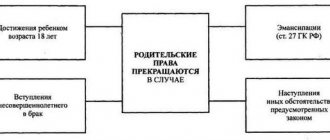- Who will the children live with after the divorce?
- Trial
- Are children's wishes taken into account?
- Deprivation of parental rights
- Mother's rights when living separately from children
What are the rights of a mother to a child during a divorce?
Many people believe that a mother’s rights to a child during a divorce are greater than those of a father. Until recently, children were almost always left with their mother upon dissolution of marriage, because the mother gave birth to and raised the child.
Currently, when deciding this issue, the court takes into account many factors, starting with the wishes of the children themselves and ending with the financial situation of the parents. When are babies left with their mother and what factors are taken into account?
Parents' rights after divorce
So, are the rights of mother and father equal?
According to established judicial practice, after a divorce, children more often remain to live with their mother than with their father . Does this mean that the mother has more rights and bears more responsibilities towards the child than the father? No.
This happens, firstly, due to the expected benefit for the child, who is accustomed to care and emotional connection with his mother, and secondly, based on the father’s ability to take care of the maintenance of the family.
But not at all because the law determines the priority and advantage of the mother over the father.
To tell the truth, the law does not contain an unequivocal statement that after a divorce the child must remain with the mother. But the legislation (Art., RF IC) enshrines the equality of the rights of parents, regardless of whether they live together or separately, are married or divorced. This means that the father and mother have the right to communicate and spend time with the child on an equal basis, to take part in his upbringing and education.
Full list of equal parental rights:
- Right to information about the child
This means that the mother and father have the right to receive complete information about their son or daughter from the educational, educational, medical institution where he is being raised, trained, or treated.
Refusal to provide such information is possible only if its disclosure poses a threat to the life and health of the child.
- The right to unhindered communication with the child
The parent with whom the child lives does not have advantages over a parent living separately. The right to see each other, spend time with the child, and raise a son or daughter belongs to the mother and father equally.
Parents do not have the right to limit each other’s participation in the child’s life.
If the other parent or strangers interfere with a full-fledged parent-child relationship, this right can be defended in court.
- The right to consent or refuse consent for a child to travel abroad
Although this right is not established by family law, but by Law No. 114 “On the procedure for leaving and entering the country,” it allows each parent to determine the location of their child and control his movement within and outside the country.
This right applies to cases where...
- the purpose of the trip is to change the child’s permanent place of residence - another state instead of the Russian Federation;
- the trip takes place without the accompaniment of a second parent.
The right of a parent to agree or not to allow a child to leave the state does not apply to cases where a son or daughter goes on a temporary trip with the other parent.
Statistics for last year
It sounds rather cynical if you say that before you get married, you need to think about how to get a divorce later.
Nevertheless, this will make life easier, and sometimes even help spouses look at such things more meaningfully, which in the future leads their relationship to deeper mutual understanding.
The share of court decisions over the entire past year, where priority was given to the mother and the children were subsequently left with her, decreased significantly.
Father's rights after divorce
Divorcing spouses still often ask lawyers questions about father's rights. Can the child stay with his father? And if he stays with his mother, will the father be able to take his son or daughter for weekends to spend time together? Can a father prohibit a trip abroad? Do schools and hospitals have to tell the father information about the child if the child is usually cared for by the mother?
Let's take a closer look at what rights the father is entitled to.
Expert opinion
Semyon Frolov
Lawyer. 7 years of experience. Specialization: family, inheritance, housing law.
So, regardless of the place of residence after a divorce (together or separately), the father does not lose parental rights and cannot be deprived or limited in his rights (except for cases expressly provided for by law, which we will discuss below).
The father retains the right:
- communicate with the child;
- bring up;
- meet with a son or daughter if he lives with his mother;
- receive complete and reliable information about the child from educational, educational, and medical institutions;
- know about the child’s attendance at school, after-school group, kindergarten, clubs, sports sections, courses;
- know the child’s health status;
- give consent (or prohibit) to travel abroad.
- give consent (or prohibit) to changing the surname;
- represent the interests of a son or daughter in court and in all state and municipal institutions.
Right to communicate
The father’s right to maintain communication with his son or daughter is provided for in paragraph 1 of Art. 66 RF IC. The child’s right to communicate with his parents is also protected by paragraph 1 of Art. 55 RF IC.
As already mentioned, after a divorce, children more often remain to live with their mother, and it is natural that the mother spends much more time with them. But divorce and change of place of residence are not a reason to stop meetings and relationships between father and child. If the father wants to maintain this relationship, the mother should not interfere with him.
Limiting the rights of the father is an exclusively judicial power, which requires compelling reasons (for example, obvious harm to the health and development of the child).
Family law prohibits the parent with whom the child lives permanently (the mother) from limiting the ability of the second parent (father) to see and raise his son or daughter. Refusals, prohibitions, interference and obstacles to meetings are a direct violation of not only parental rights, but also children’s rights.
But, unfortunately, life turns out differently.
Some mothers (perhaps not yet getting rid of personal claims against their ex-husband) begin to fear, be jealous, worry that their son or daughter is spending time with dad, and try to prevent this: they establish strict conditions, requirements, time or territorial restrictions.
If the mother and father cannot agree and find a joint compromise solution without violating parental and children's rights, the issue will have to be resolved through the court.
This topic is covered in more detail in the articles “Communication with a child after divorce” and “I pay alimony, but I don’t see the child. What to do?".
Is it possible to prohibit a father from seeing his child?
The law allows for the restriction of parental rights (Article 73 of the RF IC) if the physical and moral development of the child is at risk - due to illness, alcohol or drug addiction, or misbehavior of the parent.
In some cases, the mother has to resort to legal assistance to protect the child from negative influences from the father. But before going to court, the mother must collect evidence (certificates, medical histories, witness statements, photos and videos) - the court is not inclined to believe unfounded allegations.
Parent's consent for children to travel abroad
Each parent has the right to organize joint trips abroad with their children. However, if the mother and father are divorced, such trips must be coordinated with each other.
To travel abroad with a child, a divorced parent (mother and father) must have the following documents with them:
- parent's passport;
- birth certificate (or passport) of the child;
- foreign passport of the child and parent;
- certificate of divorce between parents;
- written consent of the second parent, certified by a notary.
Thus, the father can give consent or prohibit travel abroad. The father's ban makes it impossible for the mother and child to travel together.
A ban or permission for a child to travel abroad is a document that must be notarized . The father can submit the document to one of the government bodies:
- territorial (at place of residence) migration service authority;
- passport control authority located on the border territory;
- Russian consulate.
Expert opinion
Dmitry Nosikov
Lawyer. Specialization: family and housing law.
The father's ban on joint foreign trips between the mother and child can be appealed in court.
As judicial practice shows, often such a ban does not have good grounds and only serves as a way to cause trouble and settle personal scores with the ex-wife. Such an unfounded ban can be canceled by the court , based on the totality of the circumstances of the case. If the prohibition is reasonable (for example, related to the health of the son or daughter, which will be duly proven), the court may take the father’s side.
If both divorced parents travel abroad with their child at the same time, no permission is required. If a child travels independently without parents, he must have written and notarized consent from his mother and father (Article 20 of Federal Law No. 114 “On the procedure for departure”).
You can read more about obtaining the permission of the second parent in the article “Taking a child abroad without the permission of one of the parents after a divorce.”
Permission to change a child's surname
Often, after a divorce, a mother decides to change her last name not only for herself, but also for her child. It is easy to understand that this may be due to personal hostility and the desire to “start all over again.”
But the procedure for changing a child’s surname requires the consent of the parents and the submission of a joint application to the registry office (according to Article 59 of the RF IC, Article 63 of Federal Law No. 143 “On Civil Status Acts”).
If the father does not agree to change the child’s surname, he may refuse to submit an application to the registry office. The mother will not be able to change the child’s surname unilaterally, except in cases where the father...
- deprived of parental rights;
- declared missing by a court decision;
- declared incompetent by court decision.
Right to information about the child
The child spends most of his life not next to his parents, but next to strangers - teachers, educators, peers. As a result, many aspects of his life are hidden from the attention of his father and mother.
Therefore, the law provided for the right of parents to receive complete and reliable information about their son or daughter from various institutions: preschool, educational, educational, health, medical:
- employees of educational institutions (kindergarten, school, preparatory courses, secondary and higher educational institutions) are obliged to provide the father with information about behavior and academic performance.
- employees of medical institutions (hospitals, clinics) are required to provide information about their state of health and well-being.
It is prohibited to hide information from a parent or provide them with false information about a child. Restricting the father's right to receive information about the child is permissible only when this could cause harm to the child. However, an unlawful refusal can be appealed in court and overturned by a court decision .
Also, the father has the right to act as the legal representative of his son or daughter in any government institutions and private institutions, and to defend the interests of the child in court if they are violated.
Resolving the issue through court
If the parents are unable to agree with whom the child will live, then this issue is resolved through the court. Here they can confirm the mother’s rights to the child, and then the father will only be able to occasionally participate in his life. But there is also the option of shared custody, when the child alternates living with one or the other parent. This practice is just emerging in Russia, not all parents know about it, and not everyone agrees with it, but if the child wants to see both mom and dad, then this is the best way out.
Through the court, it is possible to specify the conditions for the father’s participation in the child’s life, for example, to determine the time for joint communication.
How a mother can strengthen her position during a divorce
If both parents are fighting for a child, then the court will consider a lot of details. But the court will only care about the interests of the child. Therefore, both the moral qualities of both parents and their financial condition are important here.
If the mother can provide the child with decent living conditions and does not lead an immoral lifestyle, then the size of the father’s income will not play a big role here. The court often takes the mother’s side, but is also interested in the child’s opinion. If a child categorically does not want to spend time with one of the parents, then his chances drop sharply. And here a fine line appears, which can be found not by lawyers, but by psychologists, which is why specialists from the guardianship authorities . A good family lawyer will tell you how to properly file for divorce and what arguments to present, so his participation can change the course of the trial and strengthen the position of the principal.
Mother's rights after divorce
According to Art. , RF IC, parental rights of mother and father (during marriage and after divorce) are equal.
Expert opinion
Semyon Frolov
Lawyer. 7 years of experience. Specialization: family, inheritance, housing law.
Above, we examined in detail the rights of the father during divorce. And it should be noted that the mother is endowed with similar parental rights:
- communicate with the child;
- bring up;
- meet with the child if he lives with his father;
- receive complete and reliable information about your son or daughter from educational, educational, and medical institutions;
- know about the child’s attendance at kindergarten, school, clubs, sports sections, courses;
- know your health status;
- allow or prohibit the child from traveling abroad;
- allow (or prohibit) changing the child’s surname;
- limit the parental rights of the father if this harms the son or daughter;
- represent the interests of the child in court and in all state and municipal institutions.
Mutual or unilateral restrictions, prohibitions, and abuse of parental rights are unacceptable. Only the court can limit or deprive the mother of parental rights - if there are compelling and legal grounds.
You may also find our article “Rights of a wife when divorcing her husband” useful.
Procedure for resolving parental disputes about children
The rights of father and mother are enshrined at the legislative level. But how they are implemented in practice, especially after a divorce, is a completely different question.
Parents who decide to divorce because married life is impossible must resolve many related issues:
- determine which of them the joint children will live with;
- decide how children can maintain a relationship with a parent who will live separately;
- agree on how a parent living separately will raise children together;
- establish the amount and procedure for paying maintenance.
Place of residence of the child
Although the law does not establish an absolute preference for the mother in determining the place of residence of children, in the overwhelming majority of cases the court rules in favor of the mother.
As a rule, the father agrees that the child living together with the mother is a reasonable decision, does not protest and does not try to “sue” his son or daughter. But sometimes the child’s place of residence often becomes a stumbling block and a dispute arises between parents over the right to live with their son or daughter.
There are several ways to decide with whom a common child will live:
- By oral agreement or written agreement.
- By applying to the court with a request to determine the child’s place of residence - if the parents cannot reach an agreement on this.
Parental Agreement
To resolve the important issue of a child’s place of residence, it is not necessary to go to court.
But since a divorce between a husband and wife with children is possible only in court, it is important to prepare to consider “children’s issues.” During the divorce process, the court is obliged to consider the issue of the child’s place of residence. If there is no dispute between the spouses or the dispute has already been resolved peacefully and voluntarily, the divorce will occur much faster and more favorably.
According to Article 24 of the RF IC, the choice of place of residence for a child rests with the parents. Thus, parents can independently agree on who the child will live with. Preferably - by drawing up a written agreement on the child’s place of residence, containing mutual rights and obligations, clear agreements, as well as responsibility for failure to comply.
A written agreement may be submitted to the court for review. If the court does not find it a violation of children's or parental rights, it will approve it.
Determining the child’s place of residence through the court
If peaceful agreements are not possible, and irresolvable disagreements have arisen between the mother and father about who the child should live with, the court must be asked to resolve the dispute.
Claims to determine the child’s place of residence can be indicated directly in the claim for divorce. The second spouse has the right to file a counterclaim, which will set out his views, arguments and demands regarding the controversial issue.
Expert opinion
Dmitry Nosikov
Lawyer. Specialization: family and housing law.
When considering the dispute, the court does not adhere to the generally accepted idea of who the child should live with, that is, it does not simply “leave the child with the mother” or “give it to the father.” First of all, the court is guided by the interests of the child , and in order to make a fair decision, it carefully studies all the circumstances of the family:
- living conditions at the place of residence of the mother and father;
- remoteness of the parent’s place of residence from a kindergarten, school, sports section;
- financial situation of parents;
- parents' employment and work schedule;
- sincere desire and ability to take care of the child, provide care, education, support in medical institutions;
- moral qualities of mother and father;
- presence (absence) of bad habits, addiction to alcohol or drugs, interest in gambling;
- presence (absence) of a criminal record;
- age and health status of parents;
- desire of a child (over 10 years old);
- the degree of emotional attachment of the child (under 10 years).
The opinion of a child who has reached 10 years of age is necessarily taken into account by the court. As for children under 10 years of age who cannot yet understand and express the desire to live with their mother or father, a forensic psychological examination is often prescribed for them to determine their attachment to their parents, the results of which are also necessarily taken into account by the court.
In the article “Determining the place of residence of a child during a divorce,” you can learn more about this.
The procedure for meeting and raising a child
After determining the child’s place of residence, an equally important question arises - in what order will his communication with the parent who lives separately take place?
There are two ways to resolve the dispute:
- On one's own. It is necessary to draw up an agreement in which a mutual compromise solution will be enshrined;
- With the help of the court. The court approves the schedule of meetings between parents and the child, determines their frequency and duration, as well as special conditions for their conduct, depending on the circumstances.
Parental agreement on communication procedures
For some parents, verbal agreements and flexible meeting conditions are sufficient. Other parents (due to work pressure, busy personal lives, or lack of communication) prefer to have a structured and well-thought-out schedule in order to stick to it.
Expert opinion
Semyon Frolov
Lawyer. 7 years of experience. Specialization: family, inheritance, housing law.
According to paragraph 2 of Art. 66 of the RF IC, parents are given the opportunity to draw up and sign an agreement on the procedure for meetings and spending time with the child.
The agreement is drawn up in free form and may contain the following agreements:
- Days of the week and hours at which the child meets with his father or mother (number and duration of meetings per week, month, year);
- The procedure for holding weekends and holidays, vacations and holidays;
- Types of leisure and pastime;
- Places where meetings and spending time together are allowed (and not allowed!) (for example, where the father lives, cafes, cinemas, children's playgrounds and other recreational places intended for children);
- The circle of people who may be present at meetings (for example, relatives);
- The right (or obligation) of the mother to be present during meetings between the child and the father;
- Responsibilities of the father and mother (for example, picking up the child from school, club or section, bringing it to the other parent, picking it up from the parent, taking care of the diet and sleep schedule).
For more information on how to correctly conclude an agreement on the procedure for meetings between a parent and a child (with a ready-made sample for downloading), see the article “Agreement on the procedure for communication, upbringing, and maintenance of a child.”
Procedure for meetings by court decision
The law assumes that parents will independently determine the order and rules of communication with the child. However, a controversial issue can be resolved through a court with the participation of a guardianship and trusteeship authority, if...
- mother and father cannot reach an agreement;
- a sharply negative relationship has developed between the parents;
- a voluntary agreement reached earlier is not implemented or violated.
The right to file a claim in court regarding the procedure for meetings with a son or daughter is vested in:
- a parent living separately and interested in meetings, spending time, and raising the child;
- a parent interested in limiting the other parent's meetings with the child.
In response to the filed claim, the second parent can file a counterclaim, which also concerns establishing the order of meetings and raising the child.
In recent years, parents have increasingly resorted to judicial protection of children's and parental rights.
But before filing a lawsuit, it is important to understand: the court is guided, first of all, by the interests and desires of the child himself, and only then by the interests and desires of the parents.
When considering a dispute and making a decision on the order of meetings between a parent and a child, the court can determine...
- days of the week or month on which the father (mother) can spend time with his son or daughter;
- duration of meetings;
- the place where meetings between the child and father (mother) should take place;
- type of meetings: meetings outside the residential premises, the child being at the place of residence of the father (mother), meetings on weekends and holidays, living with the father (mother) for a long time, etc.;
- procedure for scheduling meetings: according to a schedule, upon timely notification, upon request at any time.
The final decision of the court is binding on the parents. If the mother or father continues to confront and violate court orders, coercive measures may be taken against them (with the help of the Bailiff Service). In addition, legal parental rights may be limited by the court if the interests of the child require it or there are other valid reasons.
Alimony
If the child remains to live with the mother, the father has child support obligations.
The father is obliged to support...
- joint child - until he comes of age;
- joint adult disabled child of group I - indefinitely;
- pregnant mother - throughout the entire pregnancy;
- mother who cares for a newborn baby - for 3 years after birth;
- a mother who cares for a disabled child she shares until he comes of age.
If the child lives with the father, child support obligations may be assigned to the mother. If several joint children are “divided” between the parents, child support obligations may also be distributed between the parents depending on the number of children, the parents’ income and the children’s needs.
Expert opinion
Semyon Frolov
Lawyer. 7 years of experience. Specialization: family, inheritance, housing law.
The amount of alimony can be determined...
- by agreement between the parents (and payments should not be lower than those established by law);
- By the tribunal's decision.
If the father’s income is constant, the court orders alimony in proportions of the permanent income (for one child - 1/4 of the income, for two - 1/3 of the income, for three, for four, for five - 1/2 of the income).
The instability of the father's income is the basis for assigning child support in a fixed amount of money, the amount of which is determined depending on the needs of the child and the material capabilities of the father.
Alimony for the maintenance of the mother is always assigned in a fixed amount of money.
Why do children rarely stay with their fathers?
If we talk about 125%, then this amount of benefits is due to family members who cannot provide for themselves; 150% is for those who have lost their breadwinner due to injuries or injuries in the service that resulted in the death of the victim. For children who have lost both parents, they are entitled to PPC in the amount of 250% of the social pension.
If you need to apply for a pension, the algorithm of actions will look approximately as follows:
- The entire package of documents discussed above is collected.
- A statement is drawn up.
- Documents with the application are transferred to the Pension Fund using one of the methods described above.
- A decision is expected in 10 days.
- If the answer is positive, bank details are provided to receive the benefit.
- Percentage of total income.
The following scheme is provided:
- 25% - to one offspring;
- 33% - two children;
- 50% - for three or more children.
Note! Children, regardless of whether they were born into a legal family or out of wedlock, have the same rights to alimony. For example, one man has two children born in the family and another one outside it, so all three children have the right to equal shares of the father’s income.
- A fixed amount of money.
This is an agreed and fixed amount of funds that the parent is obliged to pay to the children systematically.
And, of course, in this case it is better for him to be raised in a single-parent family. But it is important for a woman to understand that in order to successfully raise a child, the correct formation of his psyche and social ideas, she will have to make much more effort than in a completely harmonious and prosperous family.
A family is called incomplete if one of the parents is missing. The reasons for the appearance of single-parent families can be varied; there are maternal and paternal single-parent families.
Instruction 1 An incomplete family can arise for several reasons. There are types of single-parent families: illegitimate, broken up, orphaned, divorced. The vast majority of single-parent families are maternal. 2 The remaining parent is forced to fulfill both his or her responsibilities and the responsibilities of the absent parent. He resolves both everyday and material issues.
Legal assistance!
Moscow and region
St. Petersburg and region.
Federal number
- Lack of time for a mother to raise a child or children.
- There is a clear lack of material resources with the father having them.
- The poor condition of the housing where the children are planned to move during a divorce, which will noticeably infringe on their rights.
- Maintaining an antisocial image by the mother.
Despite the equal rights of both parents during a divorce, this is precisely how judicial practice has developed that the child is left with the mother
Often, the court does not even require the mother to indicate in the statement of claim the order of child support, although Article 66 of the Family Code of the Russian Federation implies the need to submit an agreement to the court, where all the details of the children’s residence must be set out in detail. When claiming rights to a son or daughter on the father's side, the agreement is usually considered. But even before leaving children with their mother during a divorce, the court may inquire about her absence of addiction to alcohol or drugs.
The father has a greater chance of defending his rights in a divorce only if the child is over 10 years old and the judge asks his opinion about which parent he stays with and why. Here you no longer have to collect numerous witnesses and documents confirming that the father can raise his children better, as well as provide better living conditions.
We describe typical ways to resolve legal issues, but each case is unique and requires individual legal assistance.
To quickly resolve your problem, we recommend contacting qualified lawyers on our website.
The rights of parents during divorce are inseparable from their responsibilities to ensure that their children receive sufficient maintenance, upbringing and education. Fathers and mothers must not harm their offspring, exploit them, or insult, humiliate, beat, etc.
Unscrupulous mothers and fathers may lose their parental rights through the courts. Deprivation of parental rights does not mean that such parents may not provide for their offspring. Such a former spouse is obliged to pay alimony. At the same time, in old age he cannot demand money from his son or daughter for his maintenance.
Basic rules on parental rights are enshrined in the relevant UN Convention, which has been in force in Russia since 1990.
Their occurrence is regulated by the Federal Law “On Acts of Civil Status”.
Everything that concerns children is regulated in detail by the Family Code of the Russian Federation. In particular, it lists the rights of the child in the event of parental divorce and other provisions.
The procedure for establishing paternity, depriving parental rights, as well as resolving other disputes is also regulated by the norms of civil procedural legislation.
Just fill out the feedback form below the article and our lawyer will call you back at a time convenient for you! Or contact our online consultant!
When families break up, the most serious “object of division” for former spouses is their children. The scope of parental rights of former spouses after divorce depends on which parent the son or daughter will live with. According to generally accepted practice, the son or daughter remains with the mother after the divorce. However, this does not mean that the mother’s rights in a divorce exceed the father’s.
After a divorce, both parents have the right to equally protect the rights and interests of their son or daughter.
The father's rights to the child after divorce are formally equal to the mother's.
The rights of the father and mother during a divorce are often defended in court, with the help of a lawyer.
However, mothers usually take better care of their offspring and are more attached to them. It’s good when ex-spouses peacefully decide who their son or daughter should stay with. However, there are often cases when this issue cannot be resolved by mutual agreement. In this case, the dispute is resolved in court with a decision in most cases in favor of the mother, despite the fact that the rights of the parents to the child after divorce are theoretically the same.
Father's rights
A small proportion of fathers may require their son or daughter to live with them full-time.
If the mother does not agree with this, then the dispute is resolved in court on the basis of a claim to determine the place of residence of the son or daughter. Other paternity rights are listed below:
- If the children live with their mother, the father, after the divorce, has the right to see them on the territory agreed upon with the ex-wife. In theory, they can see each other as often as they want. However, some mothers, for subjective reasons, oppose communication between fathers and their son or daughter after a divorce. In addition, they often prevent children from contacting their ex-husband’s relatives who want to communicate with them. Reasonable women, on the contrary, given the adequacy of their ex-spouses, are interested in sharing responsibilities with their fathers (taking them to school, etc.).
- According to the law, it is illegal to create obstacles for children to communicate with their dad and his close relatives. To completely prohibit a former spouse from communicating with a son or daughter, a decision must be made to deprive him of parental rights. In other cases, the father and his relatives have the right through the court to oblige the ex-wife to provide visits with the children on certain days and times.
- The father also has the right to vote in matters of choosing a kindergarten, school, clubs and higher education institution for his son or daughter. He can also contribute to the upbringing of offspring. However, if there are disagreements with the mother on pedagogical issues, she cannot go to court.
- The ex-husband has the right to decide whether the children can be taken abroad or not. Without his notarized consent, the mother will not be able to take her son or daughter to another state.
- If the father suddenly becomes unable to work (disability or retirement age), he has the right to receive funds from his grown-up son or daughter for his maintenance (alimony).
In addition to the rights mentioned above, we note the following:
- A mother living with her son or daughter has the right to receive alimony from her ex-husband until they reach the age of majority. If the spouses separated when the child was under 3 years old, then his mother, who is on maternity leave, has the right to receive additional alimony from her ex-husband for her maintenance.
- If the ex-husband systematically fails to fulfill his paternal responsibilities, harms the interests of the children or creates a threat to their lives, the mother can deprive him of parental rights through the court. These are, for example, cases when he maliciously evades paying child support, abuses his paternal rights, is addicted to drugs or alcohol, abuses his son or daughter and can kill them.
During the period of restriction of parental rights, the boy and/or girl are transferred to other persons (relatives, etc.) or to the provision of a guardianship and trusteeship body. If after 6 months the situation has not been corrected, then the relevant person has the right to file a claim for deprivation of parental rights in the manner prescribed by the norms of civil procedural legislation.
Info
All this is a consequence of the spouse’s prohibitions, which are often not reasoned and are based only on personal hostility. Judicial practice usually draws attention to the fact that places of meetings with children must be established based on independent circumstances.
It is always necessary to look at the place of residence of each party. The father may have gone to live in another city, which may make the scheduling process more difficult.
- 2 How can parents reach agreement on how to communicate with their child?
- 2.1 Verbal agreement between parents
- 2.2 Written parental agreement
- 2.3 Determination of meetings with a child through the court
- 3 Schedule of communication with the child
- 3.1 Procedure for communicating with children after divorce - time and hours.
- 4 Consideration of the case and court decision
- 5 Responsibility for violating the order of communication with a child established by the court
Restriction of parental rights is applied when the child’s continued stay with the parent (or parents) may threaten his life, health and normal development.
Restrictions on the rights of a father and mother to a child
Can parents be limited in their rights to their child? Certainly! There are grounds provided by law for limiting or even depriving parents of their rights to a child.
Deprivation of parental rights
Parental rights can be deprived of a mother or father only in court if there are grounds provided for by law.
Expert opinion
Dmitry Nosikov
Lawyer. Specialization: family and housing law.
Art. 69 of the RF IC contains a complete and exhaustive list of grounds for deprivation of parental rights.
- failure to fulfill parental responsibilities (including obligations to pay child support);
- abuse of parental rights;
- refusal to pick up a child from a medical, social or educational institution without good reason;
- alcoholism or drug addiction;
- child abuse;
- committing a deliberate crime against the life and health of a child and/or spouse.
The issue of deprivation of parental rights can only be resolved in court.
If the corresponding court decision is made, the parent loses all his rights in relation to the child. However, deprivation of parental rights does not relieve the father or mother from fulfilling parental responsibilities, in particular, from the obligation to pay child support.
Restriction of parental rights
The law also provides for the concept of restriction of parental rights (according to Article 73 of the RF IC).
This happens if the parent’s communication with the child negatively affects the physical and psychological well-being of the son or daughter due to...
- parent's mental illness;
- immoral lifestyle;
- alcohol or drug addiction;
- lack of interest in reasonable education, irresponsible attitude towards the established schedule of meetings and spending time together;
- leaving a child unattended in educational, educational, medical, entertainment institutions and public places;
- deliberately inciting conflicts between a child and a parent, inciting the child against the other parent;
- violation of parental responsibilities;
- abuse of parental rights.
It is possible to restrict parental rights only in court:
- with the help of a court decision establishing the procedure for communication between a parent and a child, which determines the exact schedule and rules of meetings;
- with the help of a court decision to limit parental rights if there are legal grounds.
A parent interested in limiting the rights of the second parent must prepare and file a claim, which will set out the motives and reasons why the child’s meetings with his mother or father are undesirable, and provide reliable evidence (documents, witness statements).
For example, a certificate or extract from a psychoneurological dispensary - if the parent suffers from a mental disorder, a conclusion from a medical organization - if the parent suffers from a dangerous (contagious) disease or a chronic, serious illness that prevents full communication with the child.
A prosecutor and a representative of the guardianship and trusteeship authority must be present at the trial.
After a court decision is made, the right to unhindered communication between such a parent and the child is limited (for example, it occurs only in the presence of the other parent), but the obligation to support the son or daughter remains.
Children's rights when parents divorce
The impossibility of divorce through the registry office if the spouses have children - this limitation of the law already to some extent indicates the need to protect children's rights, especially after the divorce of the mother and father.
Firstly, the court may assign a 1-3 month delay in the dissolution of the marriage, thereby providing the spouses with the opportunity to reconcile. Secondly, if reconciliation is not possible, the court will ensure that not only the rights of the spouses are respected, but also the rights of the children.
Knowing and protecting children's rights is not a choice, but the direct responsibility of the mother and father.
Provisions on children's rights are contained in Art. 54-60 RF IC. Let's take a closer look at what rights family law gives to minor children, and how children's rights should be protected when parents divorce.
- Family life.
To the extent possible (if this does not contradict the interests of the child himself), the child’s right to live together with his parents, to receive education, care and respect from his father and mother must be realized (Article 54 of the RF IC).
In addition, the child has the right to communicate and maintain relationships with other relatives - grandparents, sisters and brothers (Article 55 of the RF IC).
Since in most cases, after a divorce, the wife and husband stop living together, the child remains to live with one of the parents. The question of who the child will stay with - dad or mom - can be resolved...
- voluntarily (orally or in the form of a written parental agreement)
- forcibly (by court).
At the same time, the second parent, even if he lives in another city or state, can (and should!) take part in the life of his son or daughter in all permitted ways - meeting them, spending time together, raising them.
Parents can agree (orally or in writing) on how often, in what form, and for what duration these meetings should be, and abide by the agreements reached. If the rights of one of the parents are violated, he has the right to go to court.
- Protection.
The protection of all legal rights and interests of the child is ensured by his parents.
But the law also provides for the right to protection from abuse or unacceptable, cruel treatment by parents (Article 56 of the RF IC).
A mother or father who evades parental responsibilities or abuses parental rights, as well as other violators of children's rights, must be brought to the types of administrative and criminal liability provided for by law and punished.
Supervision over the implementation of this provision of the law is entrusted to the local guardianship authority and the court.
- Respect for the child's opinion.
When resolving any issue concerning a child’s life, the child’s own opinion must be heard and taken into account. This provision of the law applies not only to everyday everyday situations in the family, but also to administrative or judicial proceedings (Article 57 of the RF IC).
The opinion of a child over 10 years old must be taken into account by a court or other administrative body (except in cases where it contradicts his interests).
For example, when considering a dispute between parents about choosing a child’s place of residence, the court must ask who the child wants to live with - with dad or mom, and must take the answer received into account.
- Preservation or change of surname and name (Article - RF IC).
- Ownership of income and material assets.
Property that belongs to children (inherited, received as a gift, acquired by parents and registered in the name of a son or daughter) is not subject to division between father and mother. It becomes the temporary disposal of the parent with whom the son or daughter lives after the divorce. Ownership rights remain with the child.
- Right to financial support.
Parents are required to provide for all the basic needs of their son or daughter. A mother or father living separately is obliged to regularly pay a sum of money for his maintenance - alimony. Child support is paid to the parent with whom the child lives and is spent solely on the child's needs.
What the amount and procedure for paying alimony will be depends on...
- voluntary agreement of parents (in this case, the amount of maintenance should not be lower than determined by law)
- forced court decision.
The norms for the amount of alimony that cannot be reduced are determined by law (Article - RF IC). If the parent’s income is constant, one child is entitled to 1/4 of the income, for two – 1/3, for three (four, five or more) – 1/2. If parental income is seasonal or variable, child support is paid in a fixed amount, the amount of which depends on the parent’s income and the needs of the children.
- Housing rights.
As a general rule, after a divorce, spouses lose the right to use residential premises belonging to only one of them. But this rule does not apply to children. The interests of minor children are strictly protected by law, therefore, after a divorce, the child retains the right to live in a residential area (house, apartment, room) that belongs to his father or mother.
To discharge a child from a residential premises owned by one of the parents, you need, firstly, the consent of the second parent, and secondly, the child’s registration at the place of permanent residence of the second parent. The parent with whom the son or daughter will live after the divorce must provide him with living conditions for a full life.
Expert opinion
Semyon Frolov
Lawyer. 7 years of experience. Specialization: family, inheritance, housing law.
New from February 6, 2021. Now, during a divorce, if the child remains with the mother, the court can oblige the father not only to pay alimony - the parent who will live separately must provide the child with comfortable living. What does it mean? According to the new rules, the father may be required to pay for rented housing or a mortgage on the apartment where the child lives with his ex-wife. Changes were made by Federal Law No. 10 of 02/06/2020 in paragraph 1 of Art. 86 RF IC. Previously, the separated parent had to pay for the costs associated with the child's health. Now there are housing costs. However, this requirement does not apply to all cases. The final decision is made by the court. He looks at whether the child really needs housing? Does the second parent have additional financial opportunities? Is there enough alimony to rent an apartment? Amendments to the law are designed to make life easier for mothers with children. If previously they were forced to move out of their father’s apartment or pay an expensive mortgage, now these expenses have been shifted onto the shoulders of their fathers. Provided that the latter have a job and can provide for their ex-wife and child.
If after reading the article you still have questions, if you need professional legal assistance to protect parental or child rights, we will advise you free of charge.
Ask a question to our lawyer in the 24-hour legal support chat or by calling our hotline. We will help you understand the legislation, tell you about your rights and responsibilities, and draw up a plan for further action to protect the interests of the child, mother, and father. Attention!
- Due to frequent changes in legislation, information sometimes becomes outdated faster than we can update it on the website.
- All cases are very individual and depend on many factors. Basic information does not guarantee a solution to your specific problems.
That's why FREE expert consultants work for you around the clock!
- via the form (below), or via online chat
- Call the hotline:
- Moscow and the Region
- St. Petersburg and region
- FREE for a lawyer!
By submitting data you agree to the Consent to PD Processing, PD Processing Policy and User Agreement.
Anonymously
Information about you will not be disclosed
Fast
Fill out the form and a lawyer will contact you within 5 minutes
Tell your friends
Rate ( 2 ratings, average: 5.00 out of 5)
Author of the article
Irina Garmash
Family law consultant.
Author's rating
Articles written
612
What the law says
In the practice of courts applying legislation when resolving conflict situations related to raising children, it has been established that the decision of the court in no case should contradict or in any way violate the interests of the child.
Even in court, it is possible for parents to enter into an agreement to determine the place of residence of their child, as well as the order of his meetings with the other ex-spouse.
Since the court will decide two main issues:
- where and with whom the child will live;
- procedure for payment of alimony.
The main criteria that will influence the court's decision are as follows:
- according to the established rule and practice, the mother has priority, since she is the mother in labor;
- The created comfort for life and the conditions for the further development of the child’s personality also influence. This includes both the parent’s financial status and his absence of bad habits;
- the child’s attachment to one of the parents and other family members is taken into account;
- other conditions that determine the situation in the place of residence of each spouse.
Divorce is a rather complex process. One of the most important conditions here will be a sustained approach to all its stages.
It is necessary to try to push negative emotions into the background, especially if the question arises about who minor children will stay with when their parents divorce.
We invite you to read: Dismissal of a mother with a minor child in 2021










